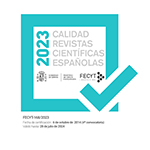Durkheim´s social fact understanding. From the material world to the collective representations domain
Abstract
Which is the understanding of the social fact underlying in The Elementary forms of religious life? Which is the relation of such understanding and the prevailing interpretations that have been generated in The rules of sociological method? These questions are interesting for two reasons: 1) the paradigmatic role that these two books have played in certain key moments in the emergence of sociology (RSM) and of anthropology (EF). 2) The opposition that seems to occur in both books, which would lead to a supposedly antithesis between Durkheim, seen as a positivist sociologist in his first stage (as it is shown in RSM), and Durkheim as a sociologist interlocutor of anthropology, who starts the study of the profound sense of social facts that is shown in EF. In order to avoid this dichotomy, it is possible to analyze Durkheim’s work as a process in which moments of continuity and rupture are put together in the path to the construction of a new general theory of social integration, in which religion takes a strategic role.Downloads
Article download
License
In order to support the global exchange of knowledge, the journal Política y Sociedad is allowing unrestricted access to its content as from its publication in this electronic edition, and as such it is an open-access journal. The originals published in this journal are the property of the Complutense University of Madrid and any reproduction thereof in full or in part must cite the source. All content is distributed under a Creative Commons Attribution 4.0 use and distribution licence (CC BY 4.0). This circumstance must be expressly stated in these terms where necessary. You can view the summary and the complete legal text of the licence.











